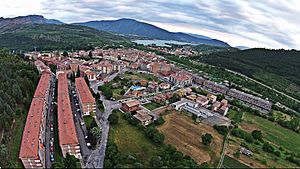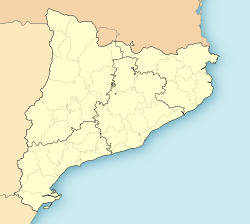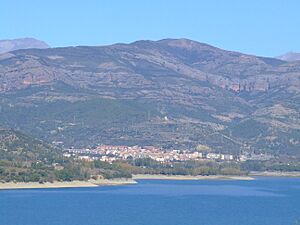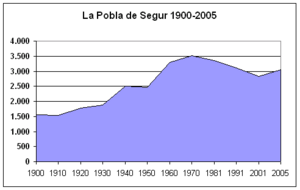La Pobla de Segur facts for kids
Quick facts for kids
La Pobla de Segur
|
||
|---|---|---|
|
Municipality
|
||
| La Pobla de Segur | ||
 |
||
|
||
| Country | ||
| Autonomous community | ||
| Province | ||
| Comarca | Pallars Jussà | |
| Area | ||
| • Total | 32.8 km2 (12.7 sq mi) | |
| Elevation | 524 m (1,719 ft) | |
| Population
(2018)
|
||
| • Total | 2,939 | |
| • Density | 89.60/km2 (232.1/sq mi) | |
| Demonym(s) | poblatà, poblatana | |
| Time zone | UTC+1 (CET) | |
| • Summer (DST) | UTC+2 (CEST) | |
| Postal code |
25500
|
|
| Dialing code | 34 (Spain) + 973 (Lleida) | |
| Official language(s) | Catalan and Spanish | |
La Pobla de Segur is a small town in northern Spain. It is part of the Catalonia region, in the Province of Lleida. The town is located in a beautiful area called Pallars Jussà.
In 2018, about 2,939 people lived here. The town sits where two rivers meet: the Flamicell and the Noguera Pallaresa. It is also near the Sant Antoni reservoir. La Pobla de Segur is an important local hub. It offers many services, which has helped it avoid losing people to bigger cities.
You can easily reach the town by road, like the C-13 and N-260. There is also a railway station connecting it to Lleida. La Pobla de Segur is known as a "book town" because it has many bookshops.
Contents
A Glimpse into La Pobla de Segur's Past
The first settlement in this area was called El Pui de Segur. It was located north of the current town. In the 800s, it became part of the county of Pallars. This happened after Count Guillaume I of Toulouse took the region from the Moors.
The town moved to its current spot in the mid-1200s. In 1355, it came under the control of Pere VII el Donzell. His son, Pere VIII, gave the town its first official rules in 1363. Later, the Dukes of Cardona took control.
The Comú de Particulars Cooperative
The Comú de Particulars is a local group that started in 1834. It was created to manage a flour mill given to the town by the Duke of Cardona. Today, it is a cultural organization. It uses money from the local hydroelectric power station to support the community. Only people born in the town or their spouses can join.
Torre Maure Buildings
The Torre Maure is a group of interesting buildings. They were built in the early 1900s in the Modernisme style. This style is similar to Art Nouveau.
How La Pobla de Segur's Population Has Grown
The table below shows how the number of people living in La Pobla de Segur has changed over many years.
| 1900 | 1910 | 1920 | 1930 | 1940 | 1950 | 1960 | 1970 | 1981 | 1991 | 1996 | 2001 | 2005 | 2011 | 2013 |
|---|---|---|---|---|---|---|---|---|---|---|---|---|---|---|
| 1.549 | 1.529 | 1.775 | 1.883 | 2.511 | 2.469 | 3.288 | 3.513 | 3.356 | 3.114 | 2.997 | 2.789 | 3.043 | 3.246 | 3.073 |
Villages Near La Pobla de Segur
The municipality of La Pobla de Segur also includes three smaller villages. Here are their populations from 2005:
- Montsor (2 people)
- Puimanyons (3 people) - This village is on the right side of the Flamicell river, where it meets the Noguera Pallaresa.
- Sant Joan de Vinyafrescal (63 people) - This village is south of La Pobla de Segur, on the right side of the Sant Antoni reservoir.
Famous People from La Pobla de Segur
La Pobla de Segur is the hometown of several well-known individuals:
- Pedro Cortina y Mauri (1908-1993) was a Spanish politician and diplomat. He served as the last Minister of Foreign Affairs under Francisco Franco.
- Josep Borrell Fontelles (born 1947) is a Spanish politician. He was the Minister of Public Works and Environment from 1991 to 1996. He also served as the President of the European Parliament from 2004 to 2007. In 2018, he became Spain's Minister of Foreign Affairs and Cooperation.
- Carles Puyol (born 1978) is a famous former football player. He played as a defender for FC Barcelona and the Spain national team. He was part of the team that won the 2010 FIFA World Cup.
Sister Cities
La Pobla de Segur has special connections with two other towns around the world:
See also
 In Spanish: Puebla de Segur para niños
In Spanish: Puebla de Segur para niños
 | Jewel Prestage |
 | Ella Baker |
 | Fannie Lou Hamer |





